The stakes for escalation in Ukraine have just been raised. The Biden administration has given the go ahead for long-range missiles to be deployed for use in Russian territory.
A familiar pattern seems to have emerged regarding the war in Ukraine. US President Joe Biden has finally relented; after much discussion with the UK, France, Germany and the new head of NATO, the US will permit the use of long-range American missiles in Russia.
Note the following sequence of events: For months Biden refused a weapons request from Ukraine, allegedly concerned it would lead to an escalation with Russia. Kyiv complains loudly to no avail. Yet, just when the deal seems dead, the Biden administration suddenly approves the request.
This sequence of events has played out before, and repeatedly. Ukraine has previously requested HIMARS, Abrams tanks, F16s – and in each case, the pattern of response was the same: first a refusal followed by prevarication, and then suddenly “permission granted,” approximately at the moment when deliveries won’t make a difference in the outcome.
Will the US-made Army Tactical Missile Systems, or ATACMS, make a difference if it hits targets deep inside Russia?
There is a simple answer here. Moreover, this fact may explain the Biden administration’s reluctance to respond to previous requests.
One factor is certainly relevant, Ukraine has only a limited number of ATACMS that it can get access to. Given their high cost ($1.0-$1.5 million per missile), Ukraine is expected to deploy ATACMS sparingly, focusing on operations targeting high-value objectives. As a consequence, Kyiv’s well-circumscribed capacity to strike targets deeper inside Russian territory is not going to produce any immediate or even significant change on the battlefield. While ATACMS has longer range — 300 km or about 190 miles — this will not significantly advantage the Ukrainian military.
President Biden has been thoroughly briefed by his Pentagon advisors. Although there were at one time hundreds of potential targets available for ATACMS, Russian airfields within their range have had their attack aircraft removed – evacuated deeper inside Russia.
Realistically, even if there were to remain a “target-rich environment” in Russia, Kyiv’s inability to acquire a sufficient number of ATACMS to make a difference will preclude altering the trajectory of the war.
In fact, some analysts are actually underwhelmed. Defense Priorities, a U.S. foreign think tank that advocates broadly against American military involvement overseas, said the Biden administration’s decision was “strategically unwise and operationally unnecessary.”
“The move will not meaningfully improve Ukraine’s military position, but it will intensify U.S. and NATO entanglement in the conflict and worsen the risk of Russian escalation—including possible retaliation on U.S. or European targets,” said the think tank’s director of military analysis, Jennifer Kavanagh.
Furthermore, Ukraine has already penetrated deeper inside Russia using domestically produced, cheaper drones, funded by the US. These platforms have for some time created havoc in Russia, harassing Moscow’s airports and across Russia’s energy infrastructure.
And certainly, the entire idea of a foreign nation seeking White House permission to employ US precision-guided missiles to strike deeper inside Russia (or any other country) is, without reservation, deeply provocative – drawing the US deeper into the conflict.
While President Putin, himself, has on several occasions admitted that Moscow is no match for NATO in a conventional conflict, eventually, the Kremlin will begin to more fully restore its deterrent capabilities regarding its borders.
There have alreadybeen allegations over the last several weeks of Russian intelligence assets harassing civilian targets throughout the EU. Just recently, Western intelligence reports suggested explosive devices were placed on courier aircraft traveling across Europe.
The Biden administration is taking a calculated risk in its decision to permit long-range missile strikes inside Russia. They are essentially weighing the reasonable utility of these missiles putting Kyiv in a better negotiating position with the Kremlin vis-a-vis the potential for damage to US or NATO assets, if Moscow honors its threat to strike back should such missiles be implemented.
Ukraine has responded to the White House’s reversal with plans to conduct its first long-range attacks in the coming days, sources said, without revealing details due to operational security concerns.
The change in the Biden administration’s position comes largely in response to Russia’s deployment of North Korean ground troops to supplement its own forces, a development that has caused alarm in Washington and Kyiv, a U.S. official and a source familiar with the decision said.
Yet, one cannot help but note the timing surrounding the Biden administration’s sudden acquiescence to Kyiv’s repeated requests after so many refusals. Could it be that Joe Biden (prior to leaving office) is determined to send a message and leave his “mark” in his latest decision to potentially escalate the war in Ukraine?
First, is the president intent on demonstrating his resolve in defending liberal democracy in Europe by supporting Ukraine? On the other hand (given what transpired before and during the recent US election) is Joe Biden intent on showing the world that he is not a weak president or person? Is he using Ukraine as a worthy means to demonstrate this?
Second, is President Biden risking escalation in Ukraine with the ATACMS decision in order to obfuscate the political situation for the man who will succeed him in that office?
The president-elect has asserted rather strongly that the Ukraine conflict (which Biden has orchestrated and supported with relentless pursuit) would be over within 24 hours of his taking office as president.
This writer believes the next two months will reveal the answer to the questions posed in this article — perhaps even before the president-elect assumes office.
The fact that Joe Biden procrastinated so long before granting his permission, to what clearly is an overture to escalation, provides at least “extraordinary symbolism” to the moment and seriousness to the decision he just made. Let us hope it was about democracy for Europe not derogation for another.
Donald Trump may believe he will be able to talk peace in Ukraine. Unfortunately, what he might actually inherit is a war – where the stakes just got significantly “escalated.”







